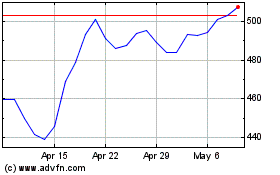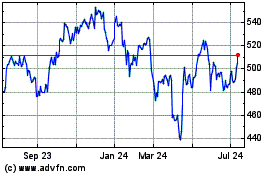UnitedHealth Boosts Earnings Outlook -- WSJ
October 17 2018 - 3:02AM
Dow Jones News
By Anna Wilde Mathews and Kimberly Chin
This article is being republished as part of our daily
reproduction of WSJ.com articles that also appeared in the U.S.
print edition of The Wall Street Journal (October 17, 2018).
UnitedHealth Group Inc. raised its full-year earnings projection
for 2018 and offered reassurance about its early outlook for next
year, as the company pointed to growth drivers including the
continuing expansion of private Medicare plans.
UnitedHealth said Tuesday it expects to earn $12.80 a share on
an adjusted basis this year, compared with the range of $12.50 to
$12.75 a share it previously suggested.
UnitedHealth Chief Executive David Wichmann said on a conference
call with analysts and investors that for next year, analysts'
consensus projection "captures our 2019 outlook within a typically
sized range," and he said that longer term, the company expects its
performance to reflect its goal of 13% to 16% earnings growth.
"We have a lot of tailwinds, and they surpass our headwinds," he
said.
Analysts said in research notes that the 2019 consensus estimate
reflects earnings-per-share growth of around 13%.
UnitedHealth, the parent of the nation's largest health insurer
as well as Optum, its growing health-services arm, said net income
in the third quarter rose 28% from a year earlier to $3.19 billion,
or $3.24 a share.
UnitedHealth's adjusted profit, which excludes
acquisition-related intangible amortization and other items, rose
to $3.41 a share. Analysts polled by Refinitiv expected the company
to earn $3.29 a share on an adjusted basis.
Revenue rose 12% to $56.56 billion; analysts had expected $56.34
billion. Revenue from its UnitedHealthcare segment grew 13% while
sales from its Optum health-services arm grew 11%.
UnitedHealth slightly beat projections for its medical-loss
ratio, or the share of premiums spent on health-care costs, in its
third-quarter results. Analysts at J.P. Morgan had written in an
early-morning note that "consensus expectations were slightly
nervous" for UnitedHealth because it had fallen slightly short of
some analysts' expectations with its second-quarter MLR.
John Rex, UnitedHealth's chief financial officer, linked the
company's MLR performance to a pharmacy and hospital inpatient
spending growth trend coming at the low end of projections.
UnitedHealth also said it retains its optimistic view about the
Medicare Advantage business, an important source of growth for the
company and the broader managed-care sector. The company said it
was expecting very strong expansion and was pleased with its
position as the 2019 open-enrollment season gets under way.
When asked about the future role of pharmacy-benefit managers,
amid questions about industry practices including its handling of
rebates obtained from drugmakers, UnitedHealth executives said they
see a continued important role, even if the industry's approach
evolves.
The company also said it is positioning its PBM as a provider of
an array of pharmacy services, including through its recent
acquisition of two specialty pharmacy operators that it said will
bolster offerings in behavioral health and oncology.
Shares in UnitedHealth, which have gained 18% this year, rose
3.93% in midday trading on the New York Stock Exchange.
Write to Anna Wilde Mathews at anna.mathews@wsj.com and Kimberly
Chin at kimberly.chin@wsj.com
(END) Dow Jones Newswires
October 17, 2018 02:47 ET (06:47 GMT)
Copyright (c) 2018 Dow Jones & Company, Inc.
UnitedHealth (NYSE:UNH)
Historical Stock Chart
From Mar 2024 to Apr 2024

UnitedHealth (NYSE:UNH)
Historical Stock Chart
From Apr 2023 to Apr 2024
